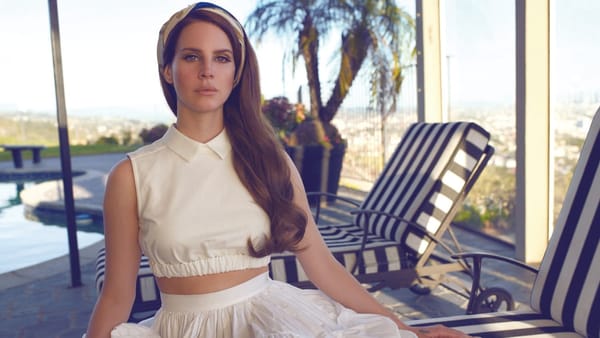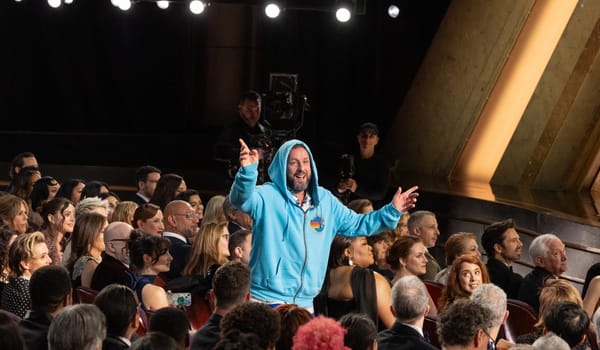Guy Love: the masculinity tug-of-war in Scrubs and Ted Lasso
guest post from Loa Beckenstein

I’m nearing the end of my semi-annual rewatch of Scrubs, my go-to comfort sitcom. I’m not sure how many times I’ve watched the entire series, but I’ve long passed the point of laughing at the jokes. Not that it’s really about the jokes. It’s about killing twenty minutes when you need a bit of entertainment while washing dishes, or folding laundry, or nursing a Pedialyte after a night out.
Of course, as any watcher of decades-old TV knows, problematic jokes and caricatures litter just about everything, and often surprise you when you least expect it.
I’d guess that’s one reason why Ted Lasso, a show that seems almost custom-built to be a comfort sitcom, is so popular. Unlike Scrubs or Friends or How I Met Your Mother, Ted Lasso has the benefit of being written in the here and now, with jokes poking fun at everything from colonialists to seltzer water.
This week on Night Water, writer Loa Beckenstein looks at both Scrubs and Ted Lasso, particularly at their portrayals of masculinity. Has the status quo of how a man can be a man changed at all in the two decades between the shows’ premieres?
I recently stumbled on a listicle that would have me believe that “Guy Love,” the Extremely Heterosexual Friendship Song that J.D. and Turk sing to each other in the Scrubs musical episode, has aged poorly. This concerned me; I had not watched “Guy Love” in many years, and I was afraid that I was about to once more realize that something I’d imprinted on as a baby queer was actually pretty messed up. But on rewatch, I found that not only was I unoffended, I was actually kinda moved. Sure, it’s homophobic in that the entire premise is that it’s weird for men to love one another. But that premise is built on the foundation that these two men love each other so much that they’re willing to get creative to let each other know.
That’s the tug-of-war at the heart of Scrubs. Starring Zach Braff as Dr. John Dorian (J.D.), Scrubs was a beautifully silly medical comedy with moments of intensity that rivaled M*A*S*H. Despite Scrubs choosing the well-trodden path of a straight white cis dude protagonist, J.D. was definitely not masc and was maybe even kinda femme. And while the show is constantly asking us to love him, it also constantly slings gendered insults at him. We’re supposed to love and accept the people derogatorily calling J.D. by traditionally feminine names as much as we’re supposed to love and accept J.D. himself. Gentleness and a taste for Toto are allowed, but only when the show also reminds us that it knows, thank you very much, that those things are abnormal.
Scrubs premiered in October 2001. Eight months before that, GLAAD led a rally at the Grammys to protest Eminem’s homophobic lyrics; twenty years later, out artist Lil Nas X gave an unquestionably queer and unquestionably lewd performance in a hot pink prison shower at the 2021 VMAs. I wouldn’t go so far as to say there’s a new normal, but there’s a lot more deviation in public space than there used to be. Bill Lawrence, who created Scrubs, has kept up with the times, albeit in a deeply unradical way (the multiple Scrubs episodes that feature blackface have been taken off streaming services because, at the height of last summer’s Black Lives Matter protests, Lawrence declared that they “made [him] feel shitty”).
Lawrence’s latest effort is Ted Lasso, an Apple TV+ dramedy about an American football coach who is tapped to coach an English soccer team. The first season of Ted Lasso was near-universally lauded for its kindness, generosity, and ability to be thoroughly optimistic without being cloying. Ted himself is a goofy, gentle man who believes in everyone and everything and is going to make sure you know it. He’s the kind of coach that everyone wishes they had when they were younger.
Ted creates a radically earnest environment. Take, for example, a scene in season two’s “Midnight Train to Royston.” Ted has the team out on the field, and he’s intense about getting them to work together. They’re not working on a play; they’re learning choreography to *NSYNC’s “Bye Bye Bye” for the team’s psychologist’s goodbye party. It’s funny not because there’s a butt of the joke, but because the team is unabashed in its joy. Of course Ted would teach the players this dance. Of course every single one would unquestioningly do it. Of course there’s nothing wrong with this.
When Scrubs has its “Bye Bye Bye” moment in season six’s “My Mirror Image,” it’s a near full-cast dance party, and the men are really going for it. But the show is sure to include a shot of two women dancing up on an older man—Dr. Bob Kelso, Chief of Medicine and notorious horndog—who turns to camera and says, “I guess this song is pretty catchy after all!” It’s an excuse, a cop-out, a distancer. The joy isn’t allowed to exist on its own terms; it has to be tethered to a reminder that Scrubs knows the status quo of what it is to be a man, and knows that you know, and isn’t actually trying to break from it. It’s an extension of the “Guy Love” conundrum—men can dance along, but only if they wink at the camera.
Ted Lasso and Scrubs are grounded in men who do not fit the mold, men who are more loving and affectionate than we’ve been taught is allowed. But the show from the ‘00s gets stuck there, constantly needing to remind us that it knows what it is. The show from the ‘20s is allowed to move on. The time that it would have spent on “no homo!” disclaimers gets spent on building and deepening the characters themselves. There is something surprisingly touching about watching the evolution from a show visibly struggling with what it can mean to be a man to a show that’s decided being a man can mean something different than it used to.
Ultimately, though, there’s a limit to what stories you can tell with straight white cis men protagonists. This is not a new or innovative critique, but it truly does bear repeating. Ted Lasso is able to be so widely beloved because even though the men talk about their feelings, even though they love one another unabashedly, they are still easily recognizable as men. None of the characters are known to be queer. None of the characters are visibly gender non-conforming. When Mitt Romney dressed as Ted Lasso for Halloween and no one blinked an eye, it became clear to me that however Ted Lasso may be contributing to any sort of cultural change, it’s intensely limited. The show offers a new status quo without actually doing anything to challenge the current one.
I love Scrubs and Ted Lasso on their own terms and think both are brimming over with heart and have moments of genuine innovation. But I can’t help but wonder what people will think of the masculinity presented in Ted Lasso in another twenty years, and if it will seem as distant as the masculinity in Scrubs does now.





